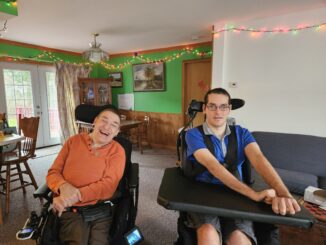
For people with developmental disabilities, moving from certified to non-certified housing can be life changing and cost-effective
by Elizabeth Ann Morabito
Housing is a fundamental social determinant of health, essential for everyone, including people with developmental disabilities (DD). Equally important is having the freedom to choose both the type of housing and the people with whom you live.
Seth Greenman, Master Housing Navigator from New York Housing Resource Center, underscores this principle: “We all have our own housing journeys that we’ve been on in our own lives, and the same should be true for people with intellectual and developmental disabilities.”
Certified housing, which includes group homes and Family Care settings, offers a regulated and supportive environment. Non-certified housing provides individuals with DD the freedom to live independently, have greater personal choice, and integrate more fully into their communities. As Greenman notes, “Non-certified housing is important because everyone should have the right to live where they want and with whom they want regardless of disability status.”
“…everyone should have the right to live where they want and with whom they want regardless of disability status.”
Seth Greenman, New York Housing Resource Center Master Housing Navigator
This transition was life-changing for Dan McCullough, who realized after living in a certified setting for eight years that it was no longer suitable for him. His mother, Nancy McCullough Stabins, wanted to help him achieve his goal of independence. Understanding the complexity involved with such a transition after a previous attempt to move failed, she reached out to Greenman.
“The role of a housing navigator is to provide an outcome-oriented, time-limited service that is focused on supporting a person with an intellectual or developmental disability to move into independent or non-certified housing,” explains Greenman. His expert guidance was pivotal in McCullough’s journey, providing the necessary support and knowledge to ensure a smooth transition.
McCullough Stabin recalls her son’s move with pride, “To see him move into his own apartment and really take control … it just empowered him in all of these different areas.” Greenman’s involvement extended beyond finding a home. He coordinated essential services, ensuring McCullough’s benefits and medical needs were met. McCullough emphasizes what Greenman’s support meant to him, “How I got the opportunity to move here was because of Seth. He helped me find this place, got me in, and I moved in. It was just a joy.”
The impact of this move has been profound. McCullough now manages his finances, keeps his apartment clean, and even cares for a dog. McCullough Stabins reflects on this transformation, “When a child is born with a disability, you realize that you’re going to be responsible for that person for the rest of your life. To be able to encourage that independence and to help him be the very best he can be just doesn’t get any better.”
Greenman observed the positive changes firsthand, “Working with Dan was exciting because I had the opportunity to see how a change in location, a change in housing, can really impact someone’s life, impact their confidence, empower them to tackle other challenges they’ve faced or other goals they’ve set.”
This move to independent living not only improved the quality of McCullough’s life but also proved to be cost-effective. According to a 2022 report by the New York Alliance for Inclusion and Innovation analyzing the three-year Master Housing Navigator program, transitioning from certified to non-certified settings can lead to significant cost savings. This is because non-certified housing often requires fewer resources and less intensive staffing, making it a more sustainable option for long-term housing.
Visit the New York Housing Resource Center to learn more about certified and non-certified housing. For more information about the New York State Council on Developmental Disabilities, go to https://cdd.ny.gov/. This program is supported by funding from the U.S. Department of Health and Human Services Administration for Community Living.



